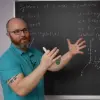

NARROW DISPLAY WARNING
You are most likely using a tablet or mobile device in portrait orientation. This website is best viewed using a typical computer screen with the browser window maximized.
Viewing this website in portrait orientation can cause problems with equations being longer than the screen width (you can scroll to the right), images being poorly sized, and the font size of maths text being much smaller than regular text. If your only option is a tablet or mobile device, your viewing experience will be better if you view this website in landscape orientation. You might need to refresh the page to fix any problems after rotating.
A Cauchy-Euler equation is a linear homogeneous ordinary differential equation with every $y^{(n)}(x)$ derivative of the unknown function multiplied by a constant and the independent variable $x^{n}$. Similarly to Bernoulli equations, Cauchy-Euler equations are a rare case of a solvable complicated ODE that the equation has been named. One of their uses is solving Laplace's equation in polar coordinates.
A Cauchy-Euler equation is an ODE of the form,
\begin{equation} a_{n}x^{n}y^{(n)}(x)+a_{n-1}x^{n-1}y^{(n-1)}(x)+ \cdots +a_{0}y(x) = 0 \end{equation}One way to solve them is guessing a homogenous solution of the form $y(x)=x^{r}$ and determining $r$, similar to guessing $y(x)=e^{rx}$ for equations of the form $ay''+by'+cy=0$. Another method is a clever change of variables.
The solutions are often defined only for $x>0$, but can be extended to everything except $x=0$ by replacing $x$ with $|x|$.
Similar to constant coefficient, there are three cases when solving the polynomial for $r$ after substituting $y(x) = x^{r}$ into the ODE.
Distinct Real Roots $r_{1}$ and $r_{2}$
\begin{equation} y_{1}(x) = x^{r_{1}} \qquad y_{2}(x) = x^{r_{2}} \end{equation}Repeated Real Root $r$
\begin{equation} y_{1}(x) = x^{r} \qquad y_{2}(x) = \ln(x)x^{r} \end{equation}Imaginary Roots $\alpha \pm \beta i$
\begin{equation} y_{1}(x) = x^{\alpha}\cos\big(\beta\ln(x)\big) \qquad y_{2}(x) = x^{\alpha}\sin\big(\beta\ln(x)\big) \end{equation}Find the general solution to the ODE by determining $r$ for the guess $y(x)=x^{r}$.
\begin{equation} x^{2}y'' - 3xy' + 3y = 0 \end{equation}Find the general solution to the ODE.
\begin{equation} x^{2}y'' + 3xy' + y = 0 \end{equation}Find the general solution to the ODE.
\begin{equation} x^{2}y'' + 3xy' + 2y = 0 \end{equation}